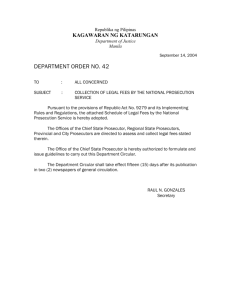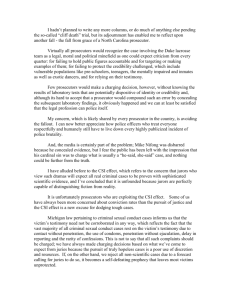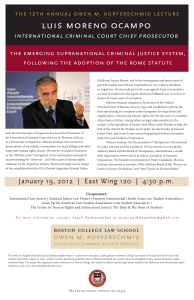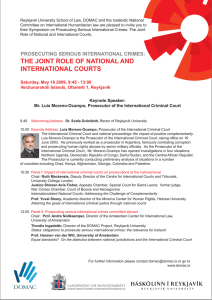Romania’s response concerning the questionnaire on military justice 1.
advertisement
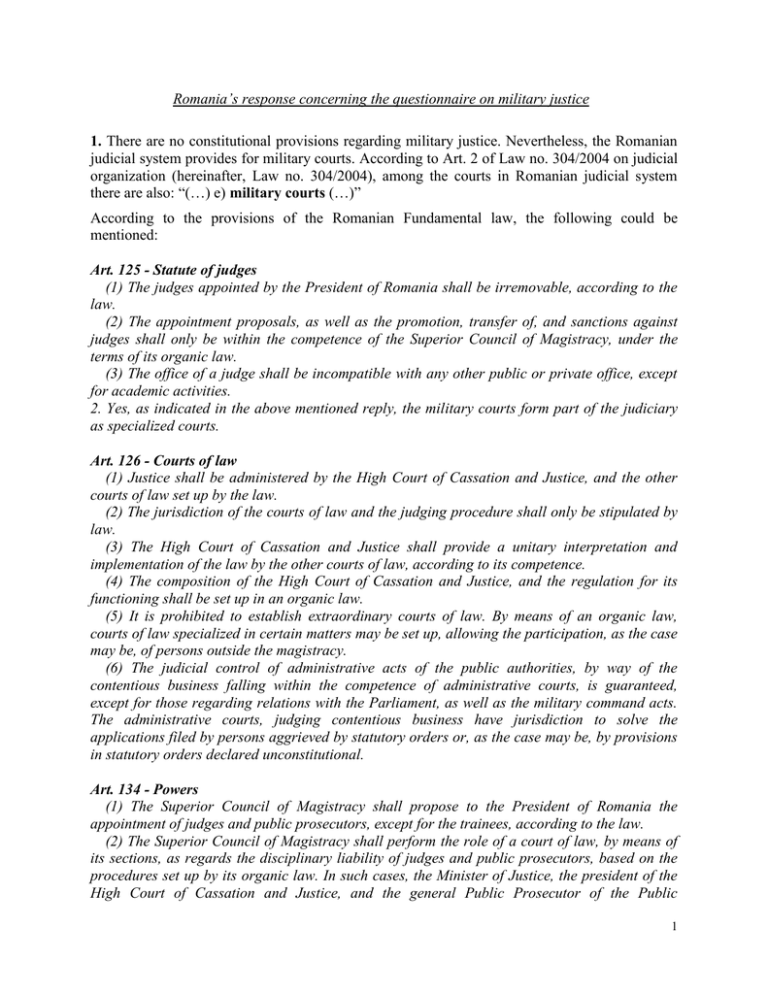
Romania’s response concerning the questionnaire on military justice 1. There are no constitutional provisions regarding military justice. Nevertheless, the Romanian judicial system provides for military courts. According to Art. 2 of Law no. 304/2004 on judicial organization (hereinafter, Law no. 304/2004), among the courts in Romanian judicial system there are also: “(…) e) military courts (…)” According to the provisions of the Romanian Fundamental law, the following could be mentioned: Art. 125 - Statute of judges (1) The judges appointed by the President of Romania shall be irremovable, according to the law. (2) The appointment proposals, as well as the promotion, transfer of, and sanctions against judges shall only be within the competence of the Superior Council of Magistracy, under the terms of its organic law. (3) The office of a judge shall be incompatible with any other public or private office, except for academic activities. 2. Yes, as indicated in the above mentioned reply, the military courts form part of the judiciary as specialized courts. Art. 126 - Courts of law (1) Justice shall be administered by the High Court of Cassation and Justice, and the other courts of law set up by the law. (2) The jurisdiction of the courts of law and the judging procedure shall only be stipulated by law. (3) The High Court of Cassation and Justice shall provide a unitary interpretation and implementation of the law by the other courts of law, according to its competence. (4) The composition of the High Court of Cassation and Justice, and the regulation for its functioning shall be set up in an organic law. (5) It is prohibited to establish extraordinary courts of law. By means of an organic law, courts of law specialized in certain matters may be set up, allowing the participation, as the case may be, of persons outside the magistracy. (6) The judicial control of administrative acts of the public authorities, by way of the contentious business falling within the competence of administrative courts, is guaranteed, except for those regarding relations with the Parliament, as well as the military command acts. The administrative courts, judging contentious business have jurisdiction to solve the applications filed by persons aggrieved by statutory orders or, as the case may be, by provisions in statutory orders declared unconstitutional. Art. 134 - Powers (1) The Superior Council of Magistracy shall propose to the President of Romania the appointment of judges and public prosecutors, except for the trainees, according to the law. (2) The Superior Council of Magistracy shall perform the role of a court of law, by means of its sections, as regards the disciplinary liability of judges and public prosecutors, based on the procedures set up by its organic law. In such cases, the Minister of Justice, the president of the High Court of Cassation and Justice, and the general Public Prosecutor of the Public 1 Prosecutor's Office attached to the High Court of Cassation and Justice shall not be entitled to vote. (3) Decisions by the Superior Council of Magistracy as regards discipline may be contested before the High Court of Cassation and Justice. (4) The Superior Council of Magistracy shall also perform other duties stipulated by its organic law, in order to accomplish its role of guarantor for the independence of justice. 2. The military courts are part of a unique judicial system. The military justice does not cover in fact all jurisdictional levels: the High Court of Cassation and Justice does not have a military section, therefore, the criminal panel shall hear the appeal or second appeal cases dealt with by the Military Court of Appeal as a first instance court or as a court of appeal. 3. According to the provisions of Law no. 304/2004, the following should be mentioned: Chapter 3 – Military courts Art. 56 (1) The military courts are: a) the military tribunals; b) the Bucharest Territorial Military Tribunal; c) Bucharest Military Appeal Court. (2) The districts of the military courts shall be provided in Annex No. 2 which is an integral part of this law. (3) Each military court has the status of military unit with its own indicative. Art. 57 (1) The military courts shall hear the cases at their premises. Only on grounded reasons, the court may order the cases to be heard elsewhere. (2) The military courts may also hear cases on the territory of other states, with respect to Romanian military personnel, members of a multinational force, provided that, according to an international convention, the Romanian jurisdiction may be exercised on the territory of the receiving state. Art. 58 (1) During court sessions, the military judges and prosecutors shall wear their military uniform. (2) When the defendant is an active officer, the president of the panel, as well as the prosecutor attending the session shall have at least the same rank as the defendant. (3) When the prosecutor has a different rank of the defendant's or accused, the former shall be assisted by another prosecutor having the appropriate rank, appointed thereto by the head of the prosecutor's office where the case was lodged. Art. 59 (1) There are also military tribunals in the counties of Bucharest, Cluj-Napoca, Iaşi and Timişoara. (2) The military tribunals shall hear the cases and claims for which the law provides jurisdiction of the former. (3) The military tribunal shall be run by a president assisted by a vice president. The provisions of art. 49 - 51 shall apply accordingly and the leading boards shall be made up of president and two judges. Art. 60 (1) The Bucharest Territorial Military Tribunal shall have its seat in Bucharest. 2 (2) The Bucharest Territorial Military Tribunal shall be run by a president assisted by a vicepresident. The provisions of art. 49 - 51 shall apply accordingly and the leading board shall be made up of a president and two judges. (3) *** Repealed Art. 61 (1) The Military Court of Appeal has its seat in the county of Bucharest, as a single court and having legal personality. It is run by a president assisted by a vice-president. The provisions of art. 49 - 51 shall apply accordingly and the leading boards shall be made up of president and two judges. (2) *** Repealed. SECTION 4 Organization of the military prosecutor's offices Art. 98 (1) A military public prosecutor's office shall function attached to each military court. The Military Public Prosecutor's Office attached to the Bucharest Court of Appeal shall function attached to the Bucharest Military Court of Appeal, the Military Public Prosecutor's Office attached to the Bucharest Territorial Military Tribunal shall function attached to the Bucharest Territorial Military Tribunal, and public prosecutor's offices attached to the military tribunals shall function attached to the military tribunals. (2) The districts of the military public prosecutor's offices shall be provided in Annex No. 2 which is an integral part of the present law. (3) Each military public prosecutor's office has the status of military unit with its own indicative. Art. 99 (1) The Military Prosecutor’s Offices shall be run by a prime military prosecutor, assisted by a deputy prime military prosecutor. (2) The Military Prosecutor’s Office attached to the Bucharest Court of Appeal shall be run by a general military prosecutor, assisted by a deputy general military prosecutor Art. 100 (1) The military public prosecutor's offices shall exercise through the military public prosecutors the powers provided in Article 63, which shall apply accordingly. (2) The military public prosecutor's offices shall carry out the criminal prosecution in the cases that concern criminal actions committed by Romanian officers displaced on the territory of other states, within certain multinational forces, provided that Romanian jurisdiction may be exercised on the territory of the receiving state, according to an international convention. The military public prosecutors shall attend the judgment sessions carried out according to Article 57. (3) The military public prosecutor's offices shall have available special investigation body in their service and they shall exercise the powers provided in Article 63 b). (4) The provisions of Article 96 and 97 shall apply accordingly. Art. 101 (1) When the defendant is an active officer, the military public prosecutor who is carrying out the criminal investigation must have at least the same rank. (2) When the rank of the public prosecutor is the same with that of the accused or defendant, it shall be assisted by another public prosecutor from the appropriate category, appointed by the head of the public prosecutor's office where the case is registered. Art. 102 3 (1) Within the Public Prosecutor's Office next to the High Court of Cassation and Justice and the National Anti-Corruption Public Prosecutor's Office there shall function divisions or departments for fighting against the offences committed by the military man which have each the status of military unit with its own indicative. (2) For the purpose of prevention and fighting against crime, as well as for the purpose of determining the cases that generate or favor crime among military men, the divisions or services within the Public Prosecutor's Office next to the High Court of Cassation and Justice and the National Anti-Corruption Public Prosecutor's Office shall organize and carry on common activities of the military public prosecutors with control bodies within the Ministry of National Defense, the Ministry of Administration and Interior, as well as within other military structures, based on protocols. As far as the military magistrates are concerned, the following provisions of Law no. 303/2004 on the statute of magistrates (hereinafter, Law no. 303/2004) are applicable: Art. 32 (1) The person who meets the requirements of the law to join the magistracy may be appointed as military judge or military prosecutor, after having acquired the capacity of active officer within the Ministry of National Defense. (2) The checks for convocation to join the active military staff, with regard to the person who meets the legal requirements to be appointed as military judge or prosecutor, shall be carried out by the authorized structure within the Ministry of Defense, which shall provide the management for the military positions at the level of courts and military prosecutor's offices. Initial and continuous training of all magistrates, either civilians or military, shall be provided by the National Institute of Magistracy (NIM) under the supervision of the Superior Council of Magistracy (SCM). There are no forms of special training within the NIM concerning military magistrates. The prosecutors within the prosecutor's offices attached to the military courts are also military officers. The Romanian legislation does not provide for military lawyers. 4. The military courts only have jurisdiction over the military personnel. Nevertheless, their jurisdiction is limited only to crimes related to their respective official military duties. There are no provisions assimilating civilians to military personnel in terms of criminal jurisdiction, either because of their duties or of their presence on or near the military facilities 5. As civilians also take part into crimes committed by military personnel, in relation with their military duties, the law specifically provides that civil court jurisdiction prevails. Art. 35 of the Criminal procedure code – Jurisdiction in joint or severance cases (1) In the situation of severance or joint cases, if the competence according to the various perpetrators or the various deeds belongs, according to the law, to several courts of the same level, then the jurisdiction to try all the deeds and perpetrators shall rest with the court which was first filed the case, and if the jurisdiction according to the nature of the deeds or to the quality of the persons belongs to courts of different levels, then the jurisdiction to try all the 4 cases shall rest with the superior level court. If of those courts, one is a civil court, and other is a military court, then the competence shall rest with the civil court. (2) If the military court is the superior level court, then the jurisdiction shall rest with the civil court corresponding to the level of the military court. (3) The competence to try the joint cases shall rest with that court, even if for the deed or perpetrator who entailed the jurisdiction of that court it was ordered the severance or the ceasing of criminal trial, or an acquittal decision was rendered. . (4) Concealment, supporting the offender and misprision of certain criminal offences shall be under the jurisdiction of the court trying the criminal offence they refer to, and if the competence according to the quality of the persons belongs to courts of different levels, the competence to try all the joint cases shall rest with the superior level court. . The Romanian Constitution formally prohibits the establishment of any “extraordinary jurisdictions/courts”, provision which is mainly to cover the war time and/or any other special circumstances. (art. 126 of the Fundamental law). 6. The military courts shall only exercise their jurisdiction over the military personnel. Their jurisdiction is limited only to crimes related to their official military duties. 7. Yes, except for the cases which are tried (as first instance, appeal or second appeal jurisdiction) by the HCCJ, which has no military section. 8. The independence of the judiciary is provided in Law no. 303/2004 and the following provisions should be mentioned: TITLE II The judges and public prosecutors' career CHAPTER I The judges and public prosecutors' admission to magistracy and their initial professional training Art. 12 The judges and public prosecutors' admission to magistracy shall take place following an examination, based on their professional competence, abilities, and good reputation. Art. 13 The admission to magistracy and initial professional training in view of taking up a judge's and public prosecutor's office shall be provided by the National Institute of Magistracy. CHAPTER II The disciplinary liability of judges and public prosecutors Art. 98 (1) The judges and public prosecutors shall be liable from the disciplinary point of view for their misconduct related to the job duties, as well as for actions affecting the prestige of the justice. (2) The disciplinary liability of military judges and public prosecutors shall only be triggered according to the provisions of the present law. 5 Art. 99 The following shall be deemed disciplinary misconducts: a) any misbehavior affecting professional integrity or honor or prestige of the judiciary, committed either in exercising one's duties or outside their scope; b) violation of the legal provisions on incompatibilities and interdictions related to the judges and public prosecutors; c) undignified performance of duties towards colleagues, other staff of the court or prosecutor's office where he/she works, judicial inspectors, lawyers, experts, witnesses, litigants or representatives of other institutions; d) conducting public political activities or expressing political opinions in exercising one's duties; e) unjustified refusal to receive the petitions, conclusions, memoranda or papers submitted by the parties to the trial; f) unjustified refusal to accomplish a job- related duty; g) failure to comply with the orders given in writing and according to the legal provisions by the superior prosecutor;. h) repeated failure for imputable reasons to comply with the provisions of the law on the quick solving of cases or the repeated delay in completing the work for imputable reasons; i) failure to comply with the duty to abstain oneself when the respective judge or prosecutor knows there is one of the causes provided by law for failure to do, as well as submitting repeated and unjustified abstention claims in the same case, which has the effect of delaying the trial; j) failure to comply with the secrecy of deliberations or confidentiality of works of such nature, as well as of any other information he/she might have been aware of in the performance of his/her duties, except for the public interest information, according to the legal provisions; k) repeated and unjustified absence from work directly affecting court's or prosecutor's office activity; l) interference with the activity of another judge or prosecutor; m) unjustified incompliance with the dispositions or administrative decisions ordered by the head of the institution according to the legal provisions, or with any other administrative duties or regulations provided by law; n) using one's position to obtain favorable treatment from the authorities or interventions to solve specific applications, demanding or accepting the solving of personal interests or of family members or of other persons, other than within the legally prescribed framework for all citizens; o) repeated or serious failure to comply with the provisions concerning the random distribution of cases; p) obstruction by any means of the inspection carried out by the judicial inspectors; q) direct participation or through intermediaries to pyramidal games, games of chance or investment systems for which the transparency of funds is not ensured; r) total lack of reasoning of the judicial decisions or of the prosecutor's judicial documents, under the law; s) use of improper language in writing the judicial decisions or the judicial documents of the prosecutor or obvious illogic reasoning of the decision, likely to affect the prestige of the judiciary or the dignity of the magistrate position; ş) incompliance with the decisions of the Constitutional Court or of the rulings delivered by the High Court of Cassation and Justice in solving the appeal on matters of law; t) gross or repeated negligence in exercising one's office. 6 As far as the remuneration is concerned, the Ministry of National Defense shall be in charge with the aforementioned, but having due regard to the criteria provided in a unitary manner for all categories of magistrates. Art. 74 (1) For their activity, the judges and public prosecutors shall be entitled to a remuneration established in relation to the level of the court of law or public prosecutor's office, the office held, the length of service in magistracy, and other criteria stipulated by law. (2) The magistrate's wage rights can only be diminished or suspended in the instances stipulated by the present law. The level of wages for the judges and public prosecutors shall be set up by a special law. (3) *** Repealed (4) The military judges and public prosecutors shall be active officers and shall have all rights and obligations arising from this capacity. (5) The remuneration and other rights due to military judges and public prosecutors shall be provided by the Ministry of National Defense, in accordance with the provisions of the laws on remuneration and other rights of the staff pertaining to the judicial authority bodies and with the regulations referring to the material and money rights specific to the capacity of active officer and, respectively, of civil employee of such ministry. (6) The military ranks shall be granted to the judges and public prosecutors and such judges and public prosecutors shall be promoted to another rank according to the rules applicable to the permanent staff of the Ministry of National Defense. 9. In order to provide the answer to questions asked at this point, the following provisions are applicable: Art. 3 of Law no. 303/2004 (1) Public prosecutors appointed by the President of Romania shall enjoy stability and independence, under the law. (2) Public prosecutors who enjoy stability may be moved by transfer, secondment, or promotion, based on their consent. They may be delegated, suspended or discharged from their office under the terms stipulated by the present law. Art. 4 (1) In their entire activity, the judges and public prosecutors shall ensure the supremacy of the law, observe the persons' rights and freedoms, as well as their equality before the law, make sure a non-discriminatory treatment is applied to all participants in judicial procedures, irrespective of their capacity, comply with the Deontological Code of judges and public prosecutors, and participate in their own constant professional training. (2) Judges may not refuse to try a case on the assumption that the law does not provide so, is unclear or incomplete. Law no. 304/2004 TITLE III The Public Ministry CHAPTER 1 - Powers of the Public Ministry 7 Art. 62 (1) The Public Ministry shall exercise its powers in compliance with the law and it shall be run by the General Public Prosecutor of the Public Prosecutor's Office attached to the High Court of Cassation and Justice. (2) Public prosecutors shall carry out their activity according to the principles of lawfulness, impartiality, and hierarchic control, under the authority of the minister of justice, according to the law. (3) Public prosecutors shall exercise their offices in compliance with the law, shall respect and protect human dignity, and shall defend human rights. (4) Public Prosecutor's Offices shall be independent in their relationships with the courts of law, as well as with the other public authorities. Art. 64 (1) The orders issued by a hierarchically superior public prosecutor in writing and in accordance with the law shall be mandatory for the public prosecutors under his/her subordination. (2) A public prosecutor shall be autonomous when issuing solutions. The public prosecutor may challenge before the Superior Council of Magistracy, within the procedure of checking the judges' and public prosecutor's conduct, the intervention of the hierarchically superior public prosecutor, under any form, for the carrying out of the criminal prosecution or in adopting a solution. (3) The solutions adopted by the prosecutor may be quashed for justified reasons by the hierarchically superior public prosecutor, when deemed unlawful. (4) The works assigned to a public prosecutor may be transferred to another public prosecutor in the following situations: a) suspension or termination of the capacity of public prosecutor, according to law; b) in his absence, if there are objective causes justifying the emergency and which prevent his/her recalling; c) not carrying any work in a case without any justification for more than 30 days. (5) The prosecutor may challenge before the Superior Council of Magistracy, within the procedure of checking the judges' and public prosecutor's conduct, the measure ordered, according to paragraph (4), by the hierarchically superior public prosecutor. Art. 65 (1) Public prosecutors in each public prosecutor's office shall be subordinated to the head of the respective public prosecutor's office. (2) The head of a public prosecutor's office shall be subordinated to the head of the hierarchically superior public prosecutor's office in the same district. (3) The control exercised by the General Public Prosecutor of the Public Prosecutor's Office attached to the High Court of Cassation and Justice, by the General Public Prosecutor of the National Anti-Corruption Public Prosecutor's Office or by the General Public Prosecutor of the Public Prosecutor's Office attached to the court of appeal over the public prosecutors under them may be carried out directly or by means of public prosecutors specially appointed to this end. Art. 67 (1) A public prosecutor shall participate in court sessions, under the terms of the law, and shall have an active part in finding the truth. (2) A public prosecutor shall be free to present, in court, the conclusions he/she deems to be well-grounded, according to the law, taking into consideration the evidence produced in that 8 case. The public prosecutor may challenge before the Superior Council of Magistracy the intervention of the hierarchically superior public prosecutor to influence the conclusions, under any form. The aforementioned provisions shall be fully applicable to military prosecutors. There are no other legal provisions that may entail the subordination of the public prosecutor on his/her magistrate duties. 10. According to the domestic provisions in the field, there are only civil lawyers. No preventive detention may be imposed before the accused has had access to his/her lawyer. If the accused does not have a lawyer, one shall be provided to him/her. The aforementioned right may not be waved. There are no limitations as to the access to a lawyer after the arrest. The accused has the right to remain silent. Before being interviewed, the accused is informed of his/her right to remain silent and of the fact that anything he/she says may be used against him/her. No interrogation shall be conducted unless the lawyer is present (being the latter either chosen or appointed ex officio) in the following circumstances: the accused is under-aged, admitted in an educational or medical-educational institute, held in custody or in any kind of detention, receiving forced medical treatment or being unwillingly hospitalized, or for any other reason unable to properly defend himself/herself. (Art. 171 of the Criminal procedure code). Whenever the lawyer’s presence is not mandatory, the latter still has the right to assist any interrogation, as well as any other proceedings conducted by the police or the prosecutor; as the lawyer expresses his/her willing to assist the proceedings, no such act may be conducted unless the lawyer has been previously informed about it (Art. 172 CPC). 11. Please see the above mentioned, specially the reference to the provisions of Law no. 303/2004 and Law no. 304/2004. Any decision not to institute proceedings or not to prosecute may be challenged before the court. The court may order the prosecutor to institute proceedings or to send the case to trial (Art. 2781 CPC). 12. There are no different criminal proceedings or provisions as for the military justice than for the civil one. As far as the international treaties are concerned, the following provision of the Romanian Constitution should be stated: Art. 11 - International law and national law (1) The Romanian State pledges to fulfill as such and in good faith its obligations as deriving from the treaties it is a party to. (2) Treaties ratified by Parliament, according to the law, are part of national law. (3) If a treaty Romania is to become a party to comprise provisions contrary to the Constitution, its ratification shall only take place after the revision of the Constitution. Art. 20 - International treaties on human rights 9 (1) Constitutional provisions concerning the citizens' rights and liberties shall be interpreted and enforced in conformity with the Universal Declaration of Human Rights, with the covenants and other treaties Romania is a party to. (2) Where any inconsistencies exist between the covenants and treaties on the fundamental human rights Romania is a party to, and the national laws, the international regulations shall take precedence, unless the Constitution or national laws comprise more favorable provisions. Romania ratified the International Covenant on Civil and Political Rights (hereinafter, ICCPR) by Decree no. 212 of 1974. 13. During the criminal proceedings, the victim may bring the action for damages to the criminal court (civil or military), together with the public action. The victim may also choose to bring the civil action separately, to the civil court. If the victim had already seized the civil court before the criminal proceedings have started, the victim may at any time leave the civil court and bring the claim to the criminal court, together with the public action (Art. 14 -19 CPC). 14. In all cases, the right to appeal is provided. In some cases, there is also the right to a second appeal (appeal on points of law). As for the competent court: In cases trialed in first instance by the military tribunals, the appeal is trialed by the Military Territorial Tribunal and, where provided, the second appeal is trialed by the Military Court of Appeal. In cases trialed in first instance by the Military Territorial Tribunal, the appeal is trialed by the Military Court of Appeal and the second appeal, where provided, is trialed by the Criminal Section of High Court of Cassation and Justice, which is a civil jurisdiction. In cases trialed by the Military Court of Appeal or by the Criminal Section of the HCCJ the appeal is trialed by the HCCJ. When there is no second appeal (appeal on points of law) provided, the appeal allows both for a review of the merits of the case as well as for an in jus review. In cases in which both remedies are provided, the second appeal only allows for an in jus review of the case. 10
